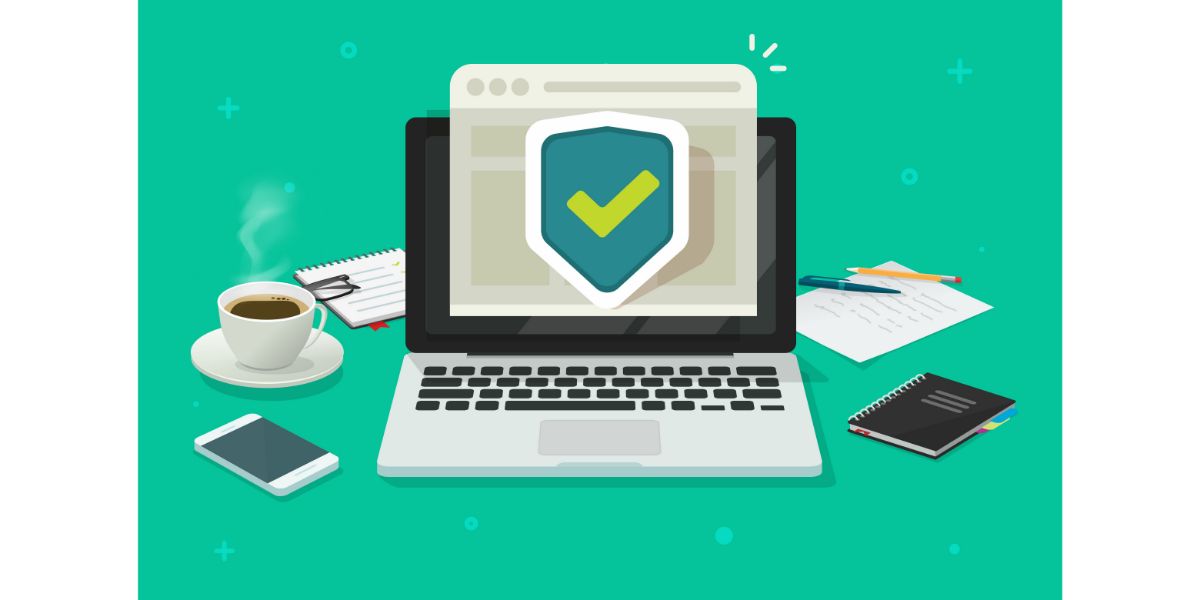Disclaimer: This post may contain affiliate links, meaning we get a small commission if you make a purchase through our links, at no cost to you. For more information, please visit our Disclaimer Page.
While you can play most games on a standard PC, you cannot keep up with hardcore players unless you have a gaming computer. A gaming PC has enough memory to store multiple games and helps you advance through levels and complete missions faster. Make sure you know about the viruses that can attack these laptops and the benefits of anti-virus software.
Table of Contents
Can Gaming Laptops Get Viruses?
There’s a misconception that gaming laptops cannot get viruses. Anytime you connect to the internet or open a new folder/file on your computer, you can download a virus that wreaks havoc on your system.
Even sites you trust to help you find safe and fun games can have an issue that lets a virus slip through with one of its download files. Viruses are essentially programs designed to do different things to your PC. While some are relatively harmless and more of a hassle, others are malicious and allow others to gain access to confidential data.
What Happens When a Laptop Gets a Virus?
When your laptop gets a virus, it will do different things based on its source code. Every virus in the world today contains a code that provides it with tasks. Looking at the different types of viruses is a good way to see what they can and will do to your gaming laptop.
Types of Viruses
Web Scripting Virus: When you pick up a web scripting virus, it will change the script on the pages and sites you visit. It might make you download other viruses without realizing it.
Resident Virus: A resident virus sticks to your RAM and finds ways to interfere with your operating system. You will have a hard time doing anything until you remove the virus.
File Infector: File infector viruses look at the files and folders you use the most often and infect them. Simply opening an app you usually use can damage your PC.
Multipartite Virus: This type of virus essentially sends spores out that infect different parts of your system. One can infect your hard drive, RAM, programs, files, folders, and OS.
Network Virus: A network virus is dangerous because it infects your system and can infect others who share your network. It can attach itself to anything you share or send.
Direct Action Virus: When you have a direct action virus, it will create spoofed versions of files and try to convince you that they are real. This can lead to you sending the virus to others in emails.
Boot Sector Virus: A boot sector virus is one of the most dangerous because it can infect multiple files in your OS. Every time you try to run your PC, you let the virus spread.
Browser Hijacker: A browser hijacker takes over your web browser. When you try to visit other sites, it will direct you to pages that contain other viruses and harmful malware.
Overwrite Virus: An overwrite virus finds programs and other files on your computer and overwrites them. You can lose a lot of data due to this type of virus.
Types of Malware
It’s not just viruses that you need to worry about because malware can also do a lot of damage to your gaming PC. Some of the different types of malware you can come across and the things they can do include:
Spyware: Spyware is dangerous because it helps others gain access to confidential data. It essentially spies on your OS and anything you do with your PC.
Worms: Worms were among the first of all malware attacks. When you download a worm, it can infect multiple files and even infect your entire OS before you find the problem.
Trojan: Trojan malware refers to viruses you download without knowing it. You usually find them hidden in files you download from the web.
Ransomware: With ransomware, you give your PC to another person. The hacker will often demand some form of ransom before you can use your PC again.
Bots: Bots are easy to pick up on the web because they look for vulnerable systems. If you do not have anti-virus software, you leave your gaming PC susceptible to bots.
Adware: Adware is often annoying because it causes ads to run when you use your PC for gaming and other activities. They can also go along with spyware.
How Do I Know if My Gaming PC Has a Virus?
Man of the signs your computer has a virus or some type of malware is when it does things it never did before. It can keep trying to change the sites that you visit, even when you type the URL by hand. For example, you enter the name of your email server in the Google search box and your PC directs you to a new site that claims you just won an iPod.
An infected PC will often display more pop-up ads than it ever did before. Not only will you see these ads when you’re online, but you might get a few ads when you have a document editor or another app open.
Another sign that you’re a victim of malware is when your PC stops responding to you. When you try to close an open tab or window, it will either leave it open or close it and open a few more.
When you try to open a file or program, the PC will tell you that you do not have permission to it or that you cannot access it. This often happens when you’re a victim of ransomware. Some of the other things that a virus can do to your gaming PC include:
Slows down your PC: Many viruses can slow your PC to a crawl and make you feel as though you can’t do anything with it.
Identity theft: There is a chance that a virus can steal your identity, which usually occurs in cases of adware and ransomware. The person who created the virus can find enough confidential data that they can open lines of credit and take out loans in your name.
Loud noises: Look out for loud noises as they are a sign that your computer uses more power. This can occur because the viruses use more power or you have an unknown mining operation on your PC.
Data usage: If you have a limit from your ISP on how much data you can use during each billing cycle, keep an eye on your bill. A sudden increase in the amount of data used is a big sign that something is wrong.
Frequent crashes: Beware of frequent crashes, too. Your gaming PC should have no problem doing simple tasks or letting you play games. If it keeps crashing when you start it or it crashes as you play, you may have a virus.
How Can a Gaming PC Get Virus? (4 Ways)
Your gaming PC can get a virus in the same way that any other PC can. Do not assume that you’re safe just because you get files from trusted sources or you limit your online activities. It’s easy to get a virus in a few different ways.
1. Emails
Emails are one of the common ways for your gaming PC to get a virus. You may already know about spam emails and realize that you should never open an email or follow a link that claims you won the lottery or that the IRS has a big tax refund waiting for you. Spoof emails look so much like the real thing that they can fool anyone.
You might get an email from your favorite game developer that claims you won a prize in a recent content or that they picked you as a beta tester for a new game. Never open an email or click a link in a message unless you can verify the sender.
2. Bad Websites
Anti-virus software often comes with built-in protection against corrupted websites. When you click on a photo or an ad on the page, you risk downloading viruses to your PC. You don’t even need to click on anything on the site to pick up a virus because some will begin downloading immediately as soon as the page loads.
Keep in mind that spoof gaming websites are around. If you’re in a hurry or not paying attention, it’s easy to click on the wrong site and wind up with a virus.
3. Infected Drives
Many games use removable drives to share games and downloads. A USB thumb drive is big enough for some basic games. With an external hard drive, you can play games on a PS4 or an Xbox One and save some space on your console.
Always use caution when you share a removable drive with someone else or use another person’s drive. As soon as you plug it into your PC, it can release a virus that runs wild. You also want to avoid using any drives you find in public.
4. Game Downloads
The web is full of websites that claim you can download games for free or get free trials. When you download a game from a website you don’t know, you risk infecting your computer. Some of these sites have infected game files that include malware and viruses that go wild as soon as the download completes.
Other websites and apps offer peer-to-peer sharing where you get games from other players. P2P networks can have some safe games but can also have a lot of infected games that circulate the web.
Can Steam Games Have Malware or Viruses?
Online gamers of all ages know the name, Steam. Steam is a gaming app that acts as a game distributor. The founders work with developers and offer their games at low prices for PC players. You can easily keep track of all your games in one convenient place and even back up copies in the cloud.
Steam uses features to make sure that games are safe for its users. Why would they let a virus slip through, knowing that the users would leave the company? It’s possible to get malware or viruses from Steam games but very unlikely.
Steam Games and Viruses
When you search the web for Steam games and viruses, you’ll find a handful of people who claim their anti-virus software found problems with their downloads. Norton is one of the main culprits because it told many users that their downloaded games were viruses or contained malware and tried to stop them from opening the games.
There’s also a common scam where someone calls you and asks if you use Steam. They then claim you downloaded a virus and that you need to pay them to remove it.
The only malware complaint that had any basis in fact was a cryptocurrency game. Steam allowed developers to release a game that turned users’ systems into cryptocurrency mining operations. It ran in the background without them knowing and used a lot of their system resources.
As soon as Steam received reports from players, it took the game down and stopped letting people download it. Feel free to use Steam to find some of the newest games and classic titles without worrying about the games infecting your PC.
Is it Safe to Use a Gaming Laptop Without An Antivirus?
No, it is absolutely not safe to use a gaming laptop without anti-virus software. Think about it this way, would you drive on the road without auto insurance? Even with auto insurance, you still follow the rules of the road and the posted speed limit.
The policy lets you know that your insurer will have your back if anything happens such as another driver crashing into the back of your car or someone pulling out in front of you.
Anti-virus software protects your gaming PC from viruses that exist today and those that appear in the future. Look at some of the other benefits anti-virus software has for your gaming laptop.
1. Check Removable Storage
Removable storage can have viruses that carry over to your PC as soon as you plug in one of these drives. If you let a friend borrow your external hard drive for a few weeks and then get it back, you might not think twice about using it to open a file or access a game.
You have no way of knowing what they did with that drive or what they saved on it. Anti-virus software allows you to scan the storage device and make sure it’s safe before you touch a single file.
2. More Privacy
One benefit of adding anti-virus software to your gaming laptop is that it gives you more privacy. You probably don’t realize just how much information you reveal to the world when you play online games.
From your username and comments you make to your IP address and character designs, it’s easy for others to use that data to learn more about you. Anti-virus software often has a feature that covers your digital footprint and keeps your personal information safe from the world.
3. Block Harmful Sites
When you’re on the hunt for the latest game at a low price, it’s easy to fall victim to a scam site. Not only do you risk downloading a file with a virus, but you might pay for a game and find that the site owner takes the money and gives you nothing in return.
With anti-virus software, you get built-in blocking of malicious websites. The software will scan the site before you click on it. If it finds anything harmful that might affect your gaming PC, it will send an alert and stop you from visiting that page.
4. No More Spam Ads
Spam ads are the bane of any online gamer. Google and other search engines track your online activities and create custom ads. If you spend a lot of time looking for game tips and shopping for games, you’ll get ads for those titles. Some of these are spam ads that redirect you to websites that try to infect your system. A good anti-virus package will block those ads.
Does Having Antivirus Installed Slow Down Games?
Many online gamers boast that they don’t need anti-virus software because they’re smart. Anti-virus can protect your PC from a lot of things that you never considered. Other gamers also claim that the software causes installed games to run slower.
In most cases, anti-virus software should not slow down your games. The makers of this software designed it to optimize your PC, which can help with your gaming experience. You might notice that your games take a few seconds longer to load but that you get fewer messages when you’re online and move faster through each level because the software closes background apps.
If you’re still hesitant about downloading anti-virus software, look for programs that have a gaming mode. This mode allows you to play as long as you want without any side effects. ESET Internet Security uses cloud scanning and will not interrupt your game when you set it to Gamer Mode.
Avira comes with features that protect you from all types of malware and will remove any files or apps from your PC that slow down your games. Other anti-virus software comes with similar features for gamers.
Conclusion
Despite what some might say, gaming laptops can get viruses. You can pick them up from emails you open, links you follow, games you download, and other sources. Find the right anti-virus software to ensure your gaming PC has all the protection it needs.



